Organizational Justice: Fairness in the Workplace
VerifiedAdded on 2023/03/20
|6
|1600
|36
AI Summary
This article discusses the concept of organizational justice and its significance in creating a fair and equal work environment. It explores a case study on Tesco employees who filed a lawsuit against the company for implementing a pay cut strategy targeting specific employees. The article highlights the negative impact of perceived discrimination or unfair treatment on employee morale, productivity, and company image.
Contribute Materials
Your contribution can guide someone’s learning journey. Share your
documents today.
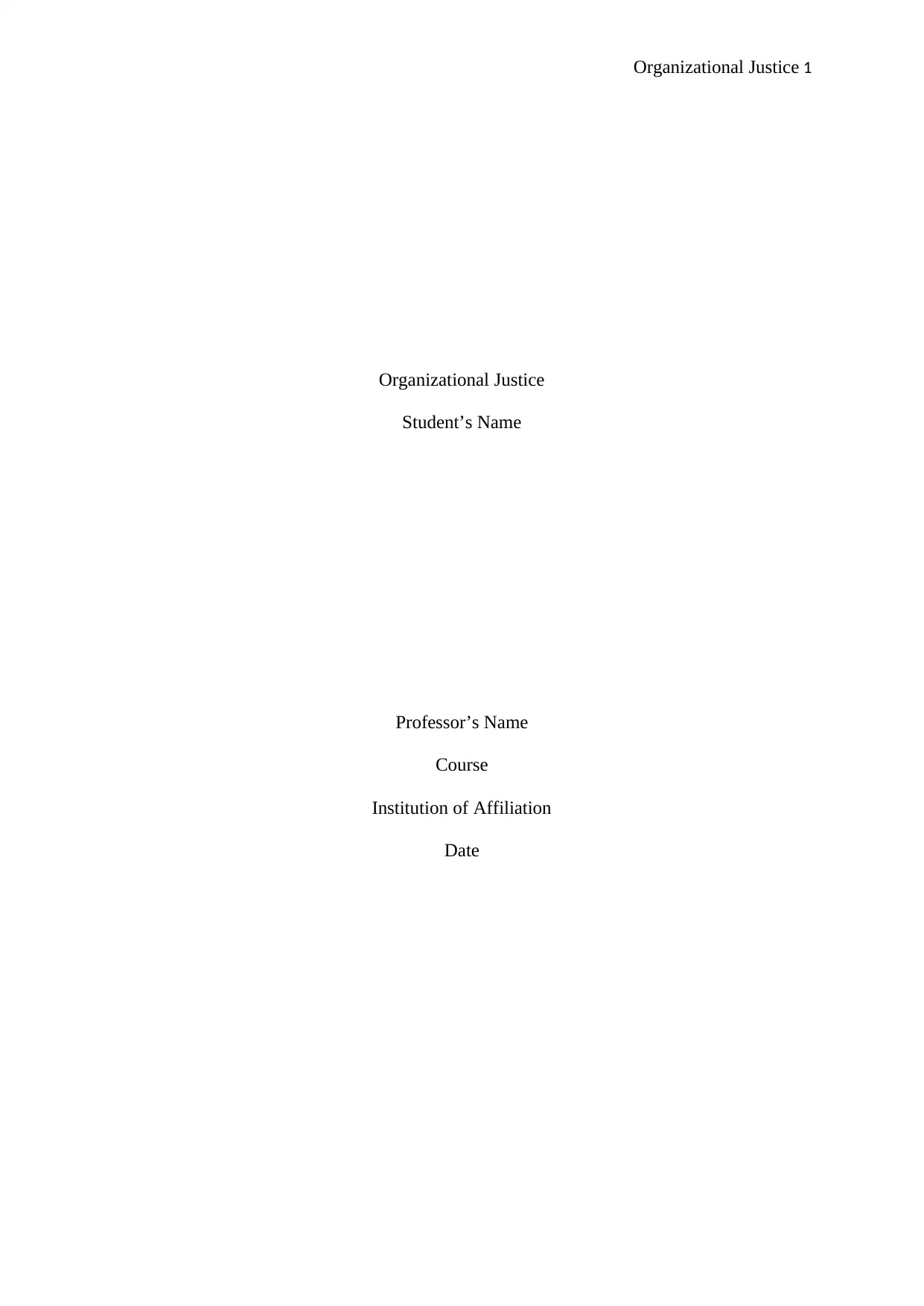
Organizational Justice 1
Organizational Justice
Student’s Name
Professor’s Name
Course
Institution of Affiliation
Date
Organizational Justice
Student’s Name
Professor’s Name
Course
Institution of Affiliation
Date
Secure Best Marks with AI Grader
Need help grading? Try our AI Grader for instant feedback on your assignments.
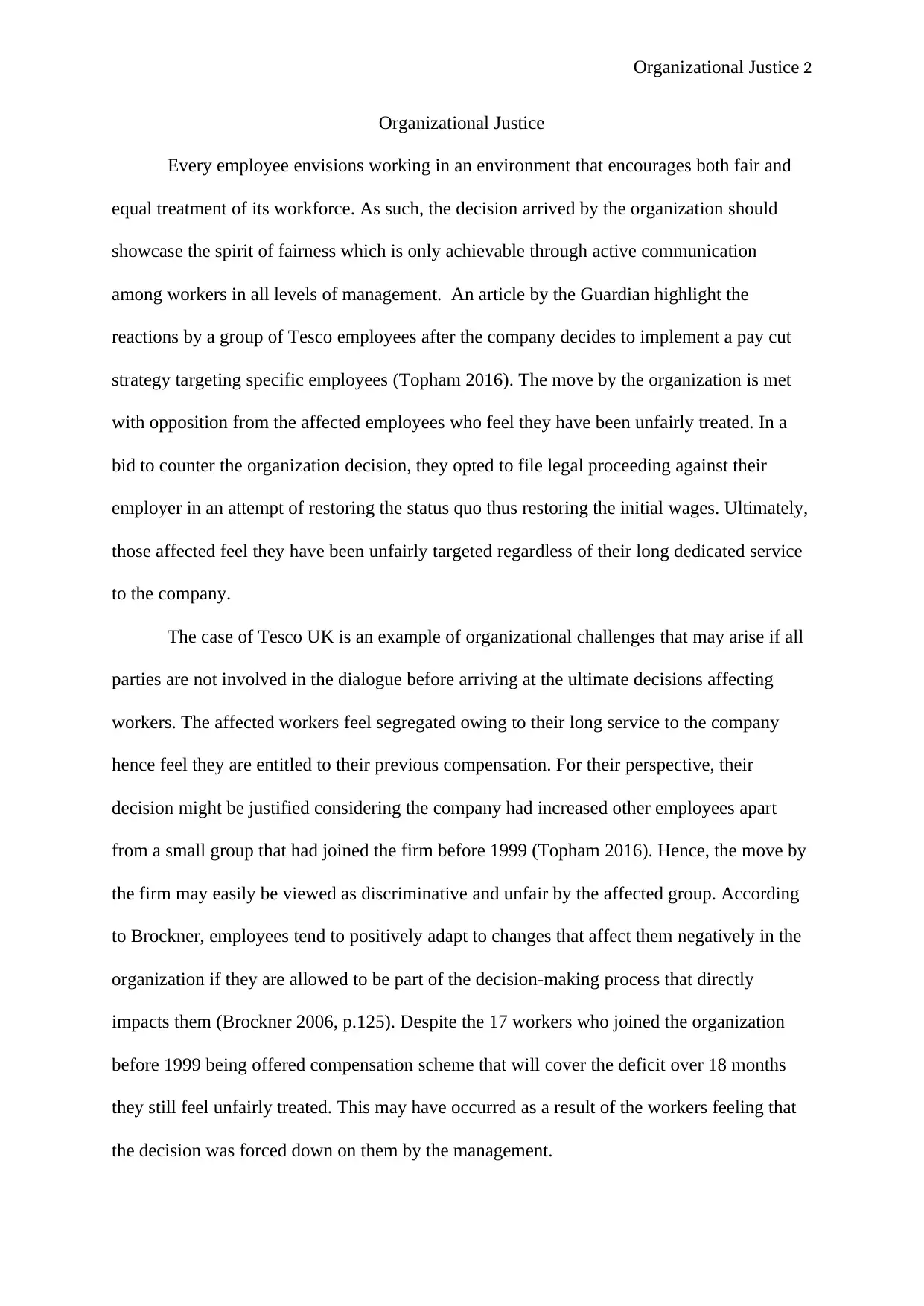
Organizational Justice 2
Organizational Justice
Every employee envisions working in an environment that encourages both fair and
equal treatment of its workforce. As such, the decision arrived by the organization should
showcase the spirit of fairness which is only achievable through active communication
among workers in all levels of management. An article by the Guardian highlight the
reactions by a group of Tesco employees after the company decides to implement a pay cut
strategy targeting specific employees (Topham 2016). The move by the organization is met
with opposition from the affected employees who feel they have been unfairly treated. In a
bid to counter the organization decision, they opted to file legal proceeding against their
employer in an attempt of restoring the status quo thus restoring the initial wages. Ultimately,
those affected feel they have been unfairly targeted regardless of their long dedicated service
to the company.
The case of Tesco UK is an example of organizational challenges that may arise if all
parties are not involved in the dialogue before arriving at the ultimate decisions affecting
workers. The affected workers feel segregated owing to their long service to the company
hence feel they are entitled to their previous compensation. For their perspective, their
decision might be justified considering the company had increased other employees apart
from a small group that had joined the firm before 1999 (Topham 2016). Hence, the move by
the firm may easily be viewed as discriminative and unfair by the affected group. According
to Brockner, employees tend to positively adapt to changes that affect them negatively in the
organization if they are allowed to be part of the decision-making process that directly
impacts them (Brockner 2006, p.125). Despite the 17 workers who joined the organization
before 1999 being offered compensation scheme that will cover the deficit over 18 months
they still feel unfairly treated. This may have occurred as a result of the workers feeling that
the decision was forced down on them by the management.
Organizational Justice
Every employee envisions working in an environment that encourages both fair and
equal treatment of its workforce. As such, the decision arrived by the organization should
showcase the spirit of fairness which is only achievable through active communication
among workers in all levels of management. An article by the Guardian highlight the
reactions by a group of Tesco employees after the company decides to implement a pay cut
strategy targeting specific employees (Topham 2016). The move by the organization is met
with opposition from the affected employees who feel they have been unfairly treated. In a
bid to counter the organization decision, they opted to file legal proceeding against their
employer in an attempt of restoring the status quo thus restoring the initial wages. Ultimately,
those affected feel they have been unfairly targeted regardless of their long dedicated service
to the company.
The case of Tesco UK is an example of organizational challenges that may arise if all
parties are not involved in the dialogue before arriving at the ultimate decisions affecting
workers. The affected workers feel segregated owing to their long service to the company
hence feel they are entitled to their previous compensation. For their perspective, their
decision might be justified considering the company had increased other employees apart
from a small group that had joined the firm before 1999 (Topham 2016). Hence, the move by
the firm may easily be viewed as discriminative and unfair by the affected group. According
to Brockner, employees tend to positively adapt to changes that affect them negatively in the
organization if they are allowed to be part of the decision-making process that directly
impacts them (Brockner 2006, p.125). Despite the 17 workers who joined the organization
before 1999 being offered compensation scheme that will cover the deficit over 18 months
they still feel unfairly treated. This may have occurred as a result of the workers feeling that
the decision was forced down on them by the management.
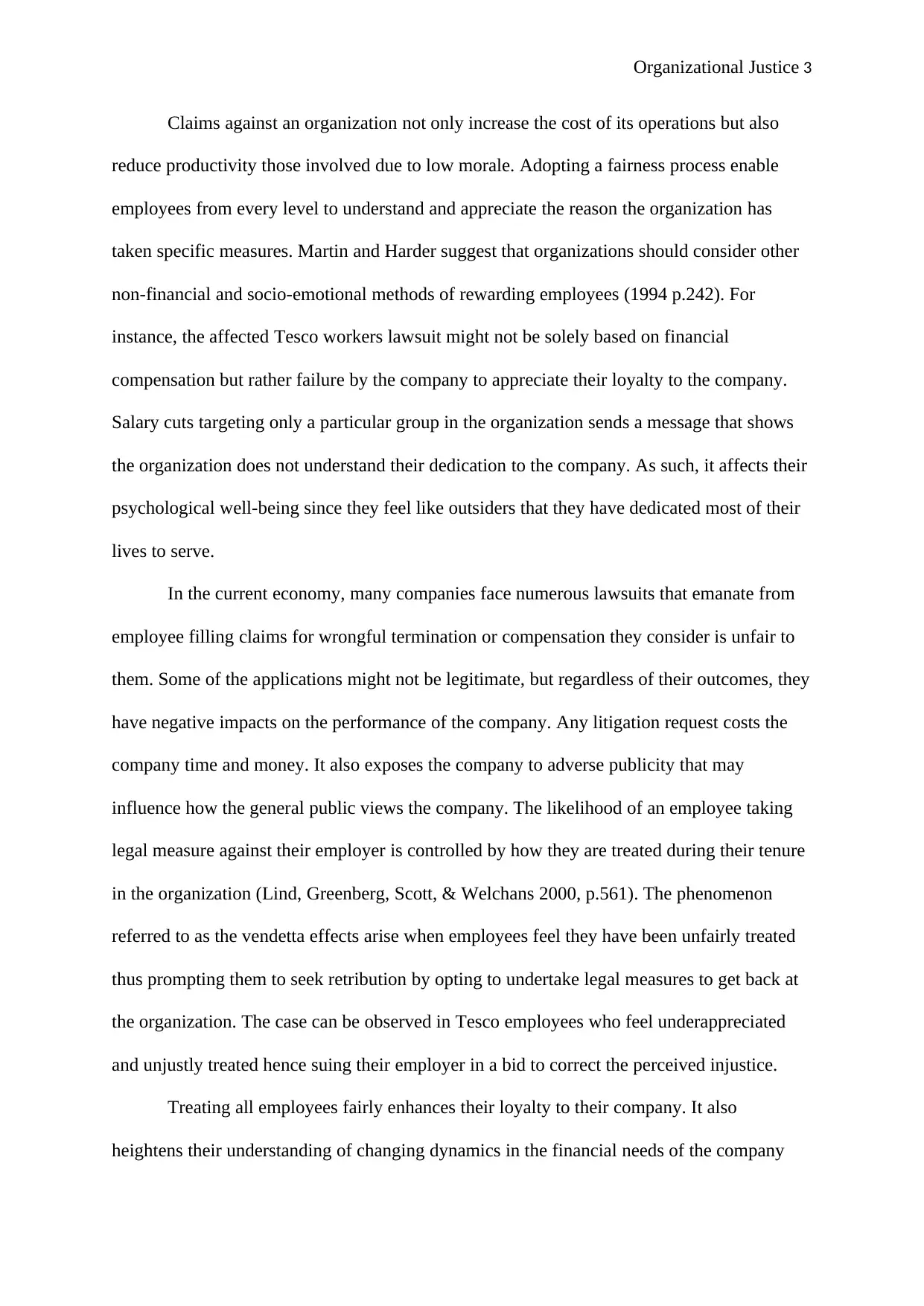
Organizational Justice 3
Claims against an organization not only increase the cost of its operations but also
reduce productivity those involved due to low morale. Adopting a fairness process enable
employees from every level to understand and appreciate the reason the organization has
taken specific measures. Martin and Harder suggest that organizations should consider other
non-financial and socio-emotional methods of rewarding employees (1994 p.242). For
instance, the affected Tesco workers lawsuit might not be solely based on financial
compensation but rather failure by the company to appreciate their loyalty to the company.
Salary cuts targeting only a particular group in the organization sends a message that shows
the organization does not understand their dedication to the company. As such, it affects their
psychological well-being since they feel like outsiders that they have dedicated most of their
lives to serve.
In the current economy, many companies face numerous lawsuits that emanate from
employee filling claims for wrongful termination or compensation they consider is unfair to
them. Some of the applications might not be legitimate, but regardless of their outcomes, they
have negative impacts on the performance of the company. Any litigation request costs the
company time and money. It also exposes the company to adverse publicity that may
influence how the general public views the company. The likelihood of an employee taking
legal measure against their employer is controlled by how they are treated during their tenure
in the organization (Lind, Greenberg, Scott, & Welchans 2000, p.561). The phenomenon
referred to as the vendetta effects arise when employees feel they have been unfairly treated
thus prompting them to seek retribution by opting to undertake legal measures to get back at
the organization. The case can be observed in Tesco employees who feel underappreciated
and unjustly treated hence suing their employer in a bid to correct the perceived injustice.
Treating all employees fairly enhances their loyalty to their company. It also
heightens their understanding of changing dynamics in the financial needs of the company
Claims against an organization not only increase the cost of its operations but also
reduce productivity those involved due to low morale. Adopting a fairness process enable
employees from every level to understand and appreciate the reason the organization has
taken specific measures. Martin and Harder suggest that organizations should consider other
non-financial and socio-emotional methods of rewarding employees (1994 p.242). For
instance, the affected Tesco workers lawsuit might not be solely based on financial
compensation but rather failure by the company to appreciate their loyalty to the company.
Salary cuts targeting only a particular group in the organization sends a message that shows
the organization does not understand their dedication to the company. As such, it affects their
psychological well-being since they feel like outsiders that they have dedicated most of their
lives to serve.
In the current economy, many companies face numerous lawsuits that emanate from
employee filling claims for wrongful termination or compensation they consider is unfair to
them. Some of the applications might not be legitimate, but regardless of their outcomes, they
have negative impacts on the performance of the company. Any litigation request costs the
company time and money. It also exposes the company to adverse publicity that may
influence how the general public views the company. The likelihood of an employee taking
legal measure against their employer is controlled by how they are treated during their tenure
in the organization (Lind, Greenberg, Scott, & Welchans 2000, p.561). The phenomenon
referred to as the vendetta effects arise when employees feel they have been unfairly treated
thus prompting them to seek retribution by opting to undertake legal measures to get back at
the organization. The case can be observed in Tesco employees who feel underappreciated
and unjustly treated hence suing their employer in a bid to correct the perceived injustice.
Treating all employees fairly enhances their loyalty to their company. It also
heightens their understanding of changing dynamics in the financial needs of the company
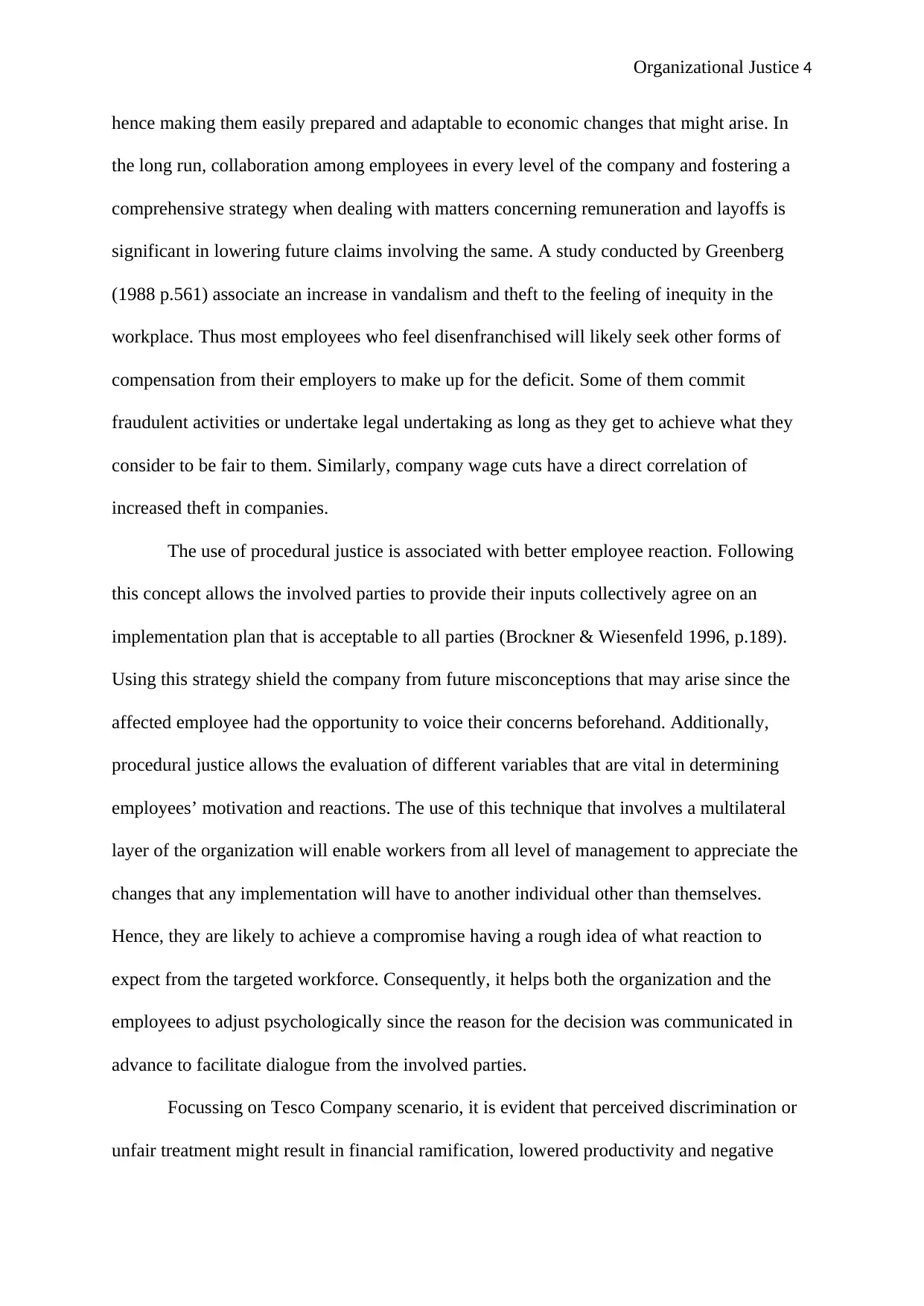
Organizational Justice 4
hence making them easily prepared and adaptable to economic changes that might arise. In
the long run, collaboration among employees in every level of the company and fostering a
comprehensive strategy when dealing with matters concerning remuneration and layoffs is
significant in lowering future claims involving the same. A study conducted by Greenberg
(1988 p.561) associate an increase in vandalism and theft to the feeling of inequity in the
workplace. Thus most employees who feel disenfranchised will likely seek other forms of
compensation from their employers to make up for the deficit. Some of them commit
fraudulent activities or undertake legal undertaking as long as they get to achieve what they
consider to be fair to them. Similarly, company wage cuts have a direct correlation of
increased theft in companies.
The use of procedural justice is associated with better employee reaction. Following
this concept allows the involved parties to provide their inputs collectively agree on an
implementation plan that is acceptable to all parties (Brockner & Wiesenfeld 1996, p.189).
Using this strategy shield the company from future misconceptions that may arise since the
affected employee had the opportunity to voice their concerns beforehand. Additionally,
procedural justice allows the evaluation of different variables that are vital in determining
employees’ motivation and reactions. The use of this technique that involves a multilateral
layer of the organization will enable workers from all level of management to appreciate the
changes that any implementation will have to another individual other than themselves.
Hence, they are likely to achieve a compromise having a rough idea of what reaction to
expect from the targeted workforce. Consequently, it helps both the organization and the
employees to adjust psychologically since the reason for the decision was communicated in
advance to facilitate dialogue from the involved parties.
Focussing on Tesco Company scenario, it is evident that perceived discrimination or
unfair treatment might result in financial ramification, lowered productivity and negative
hence making them easily prepared and adaptable to economic changes that might arise. In
the long run, collaboration among employees in every level of the company and fostering a
comprehensive strategy when dealing with matters concerning remuneration and layoffs is
significant in lowering future claims involving the same. A study conducted by Greenberg
(1988 p.561) associate an increase in vandalism and theft to the feeling of inequity in the
workplace. Thus most employees who feel disenfranchised will likely seek other forms of
compensation from their employers to make up for the deficit. Some of them commit
fraudulent activities or undertake legal undertaking as long as they get to achieve what they
consider to be fair to them. Similarly, company wage cuts have a direct correlation of
increased theft in companies.
The use of procedural justice is associated with better employee reaction. Following
this concept allows the involved parties to provide their inputs collectively agree on an
implementation plan that is acceptable to all parties (Brockner & Wiesenfeld 1996, p.189).
Using this strategy shield the company from future misconceptions that may arise since the
affected employee had the opportunity to voice their concerns beforehand. Additionally,
procedural justice allows the evaluation of different variables that are vital in determining
employees’ motivation and reactions. The use of this technique that involves a multilateral
layer of the organization will enable workers from all level of management to appreciate the
changes that any implementation will have to another individual other than themselves.
Hence, they are likely to achieve a compromise having a rough idea of what reaction to
expect from the targeted workforce. Consequently, it helps both the organization and the
employees to adjust psychologically since the reason for the decision was communicated in
advance to facilitate dialogue from the involved parties.
Focussing on Tesco Company scenario, it is evident that perceived discrimination or
unfair treatment might result in financial ramification, lowered productivity and negative
Secure Best Marks with AI Grader
Need help grading? Try our AI Grader for instant feedback on your assignments.
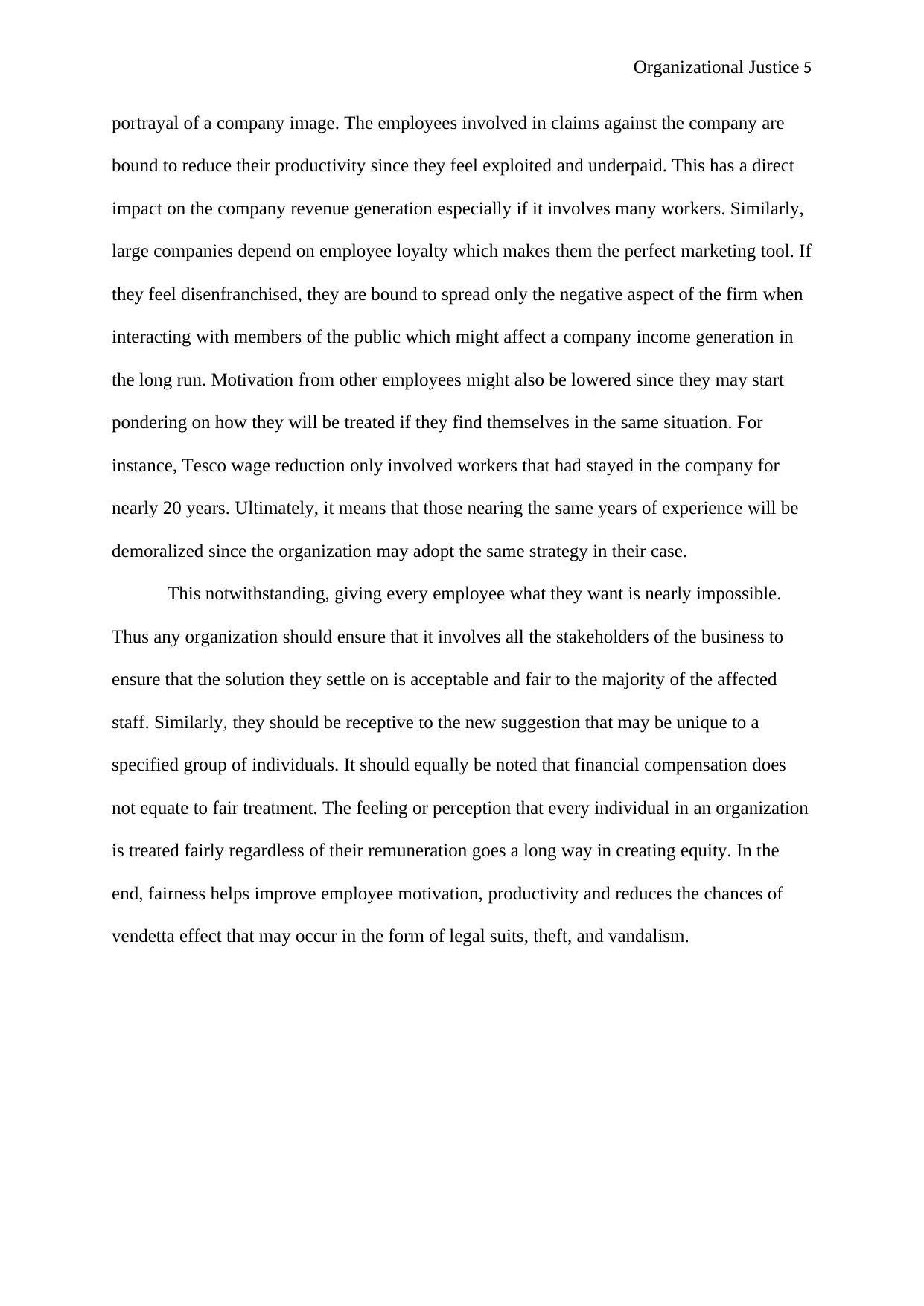
Organizational Justice 5
portrayal of a company image. The employees involved in claims against the company are
bound to reduce their productivity since they feel exploited and underpaid. This has a direct
impact on the company revenue generation especially if it involves many workers. Similarly,
large companies depend on employee loyalty which makes them the perfect marketing tool. If
they feel disenfranchised, they are bound to spread only the negative aspect of the firm when
interacting with members of the public which might affect a company income generation in
the long run. Motivation from other employees might also be lowered since they may start
pondering on how they will be treated if they find themselves in the same situation. For
instance, Tesco wage reduction only involved workers that had stayed in the company for
nearly 20 years. Ultimately, it means that those nearing the same years of experience will be
demoralized since the organization may adopt the same strategy in their case.
This notwithstanding, giving every employee what they want is nearly impossible.
Thus any organization should ensure that it involves all the stakeholders of the business to
ensure that the solution they settle on is acceptable and fair to the majority of the affected
staff. Similarly, they should be receptive to the new suggestion that may be unique to a
specified group of individuals. It should equally be noted that financial compensation does
not equate to fair treatment. The feeling or perception that every individual in an organization
is treated fairly regardless of their remuneration goes a long way in creating equity. In the
end, fairness helps improve employee motivation, productivity and reduces the chances of
vendetta effect that may occur in the form of legal suits, theft, and vandalism.
portrayal of a company image. The employees involved in claims against the company are
bound to reduce their productivity since they feel exploited and underpaid. This has a direct
impact on the company revenue generation especially if it involves many workers. Similarly,
large companies depend on employee loyalty which makes them the perfect marketing tool. If
they feel disenfranchised, they are bound to spread only the negative aspect of the firm when
interacting with members of the public which might affect a company income generation in
the long run. Motivation from other employees might also be lowered since they may start
pondering on how they will be treated if they find themselves in the same situation. For
instance, Tesco wage reduction only involved workers that had stayed in the company for
nearly 20 years. Ultimately, it means that those nearing the same years of experience will be
demoralized since the organization may adopt the same strategy in their case.
This notwithstanding, giving every employee what they want is nearly impossible.
Thus any organization should ensure that it involves all the stakeholders of the business to
ensure that the solution they settle on is acceptable and fair to the majority of the affected
staff. Similarly, they should be receptive to the new suggestion that may be unique to a
specified group of individuals. It should equally be noted that financial compensation does
not equate to fair treatment. The feeling or perception that every individual in an organization
is treated fairly regardless of their remuneration goes a long way in creating equity. In the
end, fairness helps improve employee motivation, productivity and reduces the chances of
vendetta effect that may occur in the form of legal suits, theft, and vandalism.
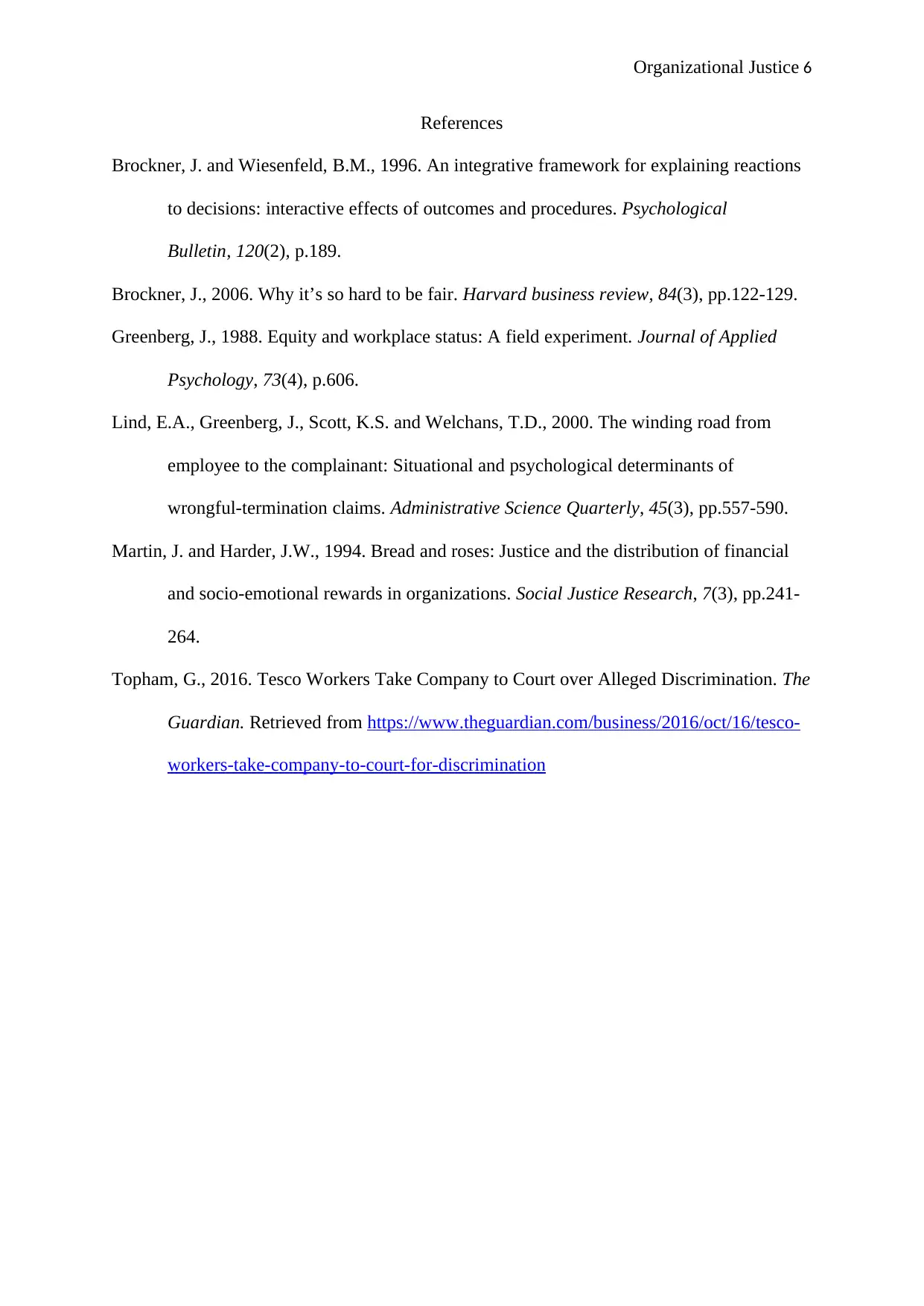
Organizational Justice 6
References
Brockner, J. and Wiesenfeld, B.M., 1996. An integrative framework for explaining reactions
to decisions: interactive effects of outcomes and procedures. Psychological
Bulletin, 120(2), p.189.
Brockner, J., 2006. Why it’s so hard to be fair. Harvard business review, 84(3), pp.122-129.
Greenberg, J., 1988. Equity and workplace status: A field experiment. Journal of Applied
Psychology, 73(4), p.606.
Lind, E.A., Greenberg, J., Scott, K.S. and Welchans, T.D., 2000. The winding road from
employee to the complainant: Situational and psychological determinants of
wrongful-termination claims. Administrative Science Quarterly, 45(3), pp.557-590.
Martin, J. and Harder, J.W., 1994. Bread and roses: Justice and the distribution of financial
and socio-emotional rewards in organizations. Social Justice Research, 7(3), pp.241-
264.
Topham, G., 2016. Tesco Workers Take Company to Court over Alleged Discrimination. The
Guardian. Retrieved from https://www.theguardian.com/business/2016/oct/16/tesco-
workers-take-company-to-court-for-discrimination
References
Brockner, J. and Wiesenfeld, B.M., 1996. An integrative framework for explaining reactions
to decisions: interactive effects of outcomes and procedures. Psychological
Bulletin, 120(2), p.189.
Brockner, J., 2006. Why it’s so hard to be fair. Harvard business review, 84(3), pp.122-129.
Greenberg, J., 1988. Equity and workplace status: A field experiment. Journal of Applied
Psychology, 73(4), p.606.
Lind, E.A., Greenberg, J., Scott, K.S. and Welchans, T.D., 2000. The winding road from
employee to the complainant: Situational and psychological determinants of
wrongful-termination claims. Administrative Science Quarterly, 45(3), pp.557-590.
Martin, J. and Harder, J.W., 1994. Bread and roses: Justice and the distribution of financial
and socio-emotional rewards in organizations. Social Justice Research, 7(3), pp.241-
264.
Topham, G., 2016. Tesco Workers Take Company to Court over Alleged Discrimination. The
Guardian. Retrieved from https://www.theguardian.com/business/2016/oct/16/tesco-
workers-take-company-to-court-for-discrimination
1 out of 6
Related Documents
Your All-in-One AI-Powered Toolkit for Academic Success.
+13062052269
info@desklib.com
Available 24*7 on WhatsApp / Email
![[object Object]](/_next/static/media/star-bottom.7253800d.svg)
Unlock your academic potential
© 2024 | Zucol Services PVT LTD | All rights reserved.
